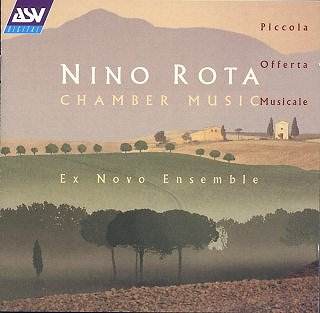Nino ROTA * Chamber Music
* Sonata for flute and harp (1937), Trio for clarinet, cello and piano
(1973), String Quartet (1948), Quintet for flute, oboe, viola, cello and
harp, (1935), Trio for flute, violin and piano (1958), Piccola Offerta Musicale
for wind quintet (1943)
 Ex Novo Ensemble
Ex Novo Ensemble
 ASV CD DCA 1072
[72:39]
ASV CD DCA 1072
[72:39]

Nino Rota has for decades been tarred with the same lazy brush used to paint
Erich Wolfgang Korngold into the musical background of the 20th
Century. Both were child prodigies, Korngold premiering an opera at 12, Rota
conducting his oratorio The Childhood of John the Baptist at 11, and
both had the unthinkable temerity to be successful film composers. Snobbery
and prejudice runs as deep in the classical music world as anywhere, so it
is heartening that following the rehabilitation of Korngold, Rota is finally
being recognised as worthwhile composer. A disc of two piano concertos has
recently been released, while this current programme collects 6 chamber works.
Rota was born in 1911, his home city was Milan, and wrote 150 'serious works',
and as many film scores. His music has a light, clean elegance in which can
be seen the influence of Debussy and Ravel, as well as the later group of
French composers known as Les Six (particularly Auric, Poulenc and
Tailleferre) who were operative in the 20's when Rota would have been
particularly open to musical influence.
The Sonata for flute and Harp (1937) is playful and utterly beguiling. To
say that it is typical of tonal chamber music of the period is not to do
it a disservice, and the performances have a pleasingly airy touch. The works
are not sequenced in order, and the opening piece from 1937 leads to the
Trio for clarinet, cello and piano from 1973, the Allegro festoso
which ends the first work deliberately echoed in the opening Allegro
of the second. The Allegrissimo which ends the trio has a playful
wit which must have seemed very out of time to the critical fascists of 1973,
always so keen to dictate what music should sound like, a finale very
much replete with a skittish humour that refers back to Poulenc. Still, Rota
had survived one lot of fascists in his native land (in 1933 he wrote he
first film score for the fascist film The People's Train), and clearly
he had no intention of allowing a musical version of the same mentality to
govern his compositional life.
It could be argued that the String Quartet (1948) is a neo-classical
work - Rota was friends with Stravinsky after all. It certainly has that
sort of clear elegance, and a happy lack of tortured romantic questing, yet
there is a nostalgic yearning in the opening them which is more warm-hearted
than the neo-classical school usually offered, and rather seems to prefigure
some of Bernard Herrmann's chamber music, specifically, the lovely Clarinet
quintet - Souvenirs de Voyage (1967). The Quintet for flute, oboe,
viola, cello and harp (1935) is the sort of beautiful, descriptive pastoral
work which might be taken for something out of the line of Vaughan-Williams
or Bax, except that there is also a clearly Italianate line of sunny romance
with one eye on the distance past that would reappear in one of Rota's most
famous film scores, Romeo and Juliet (1968). It is a lovely work at
which cynics will delight in sneering, but has an innocent freshness of a
perfect summer's day in the country. The adagio has a folksong-like tranquil
melancholy, a gorgeous melodic sense just right for Shakespeare's star-crossed
lovers. Indeed, two years later, Rota's thesis studied the 16th
century Venetian composer and theorist Gioseffo Zarlino, while Rota's first
regular music teacher was Pizzetti, whose 'Pizettian counterpoint' was inspired
by the Italian Renaissance.
The Trio for flute, violin and piano (1958) has an urgent propulsive
drive in the opening which soon surrenders to a more languid atmosphere,
the ideas alternating like a dance, a flirtation, a courtship, perhaps a
three way argument in which no one really falls out and everything is amicable
resolved in the genial finale. The disc ends with the short Piccola Offerta
Musicale for wind quintet (1943). This is a single movement running 3:43
in this performance full of vivacious charm and jokes.
The playing by the members of Ex Nono Ensemble seems utterly in sympathy
with this music, simply enjoying the pleasure it brings while delivering
rounded and accomplished performances. The sound meanwhile, is clear and
natural, with an appropriately airy acoustic.
Rota once said, "I'd do everything I could to give everyone a moment of
happiness That's what's at the heart of my music." Perhaps why other,
less happy, more neurotic, critics have for so long dismissed him. "They
reckon my music's just a bit of nostalgia, plus lots of good humour and optimism?
Well, that's exactly how I'd like to be remembered…"
And perhaps we will, long after the tiresome snipping has been forgotten.
A very lovely album indeed.
Reviewer
Gary S. Dalkin

